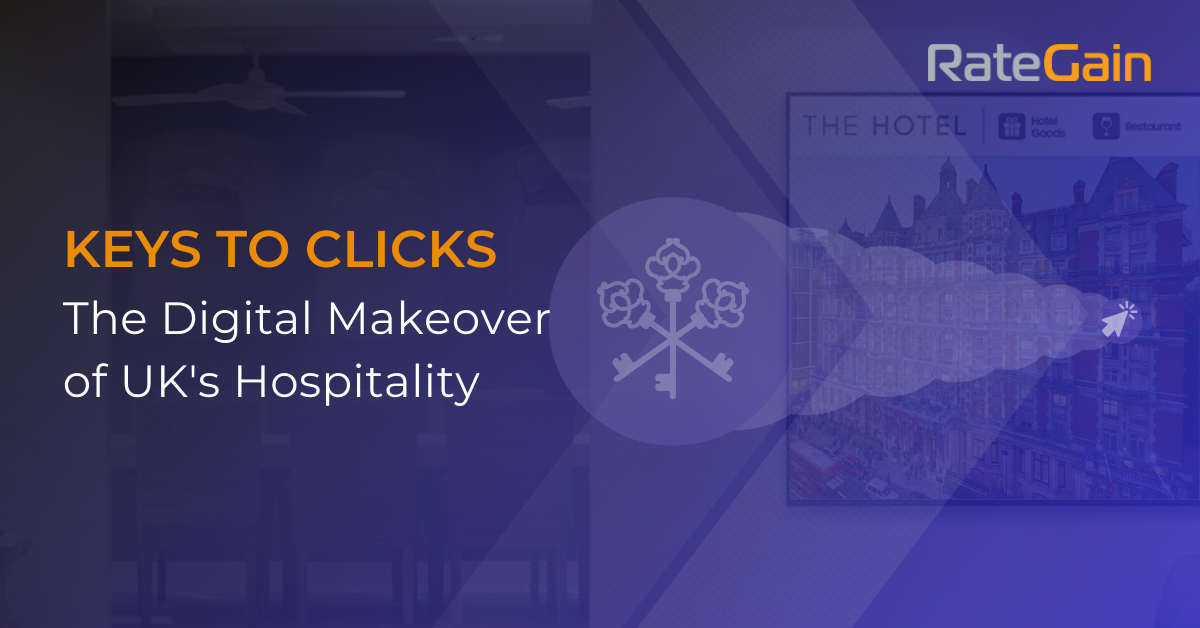Join us on a fascinating journey through time as we uncover the captivating transformation of the United Kingdom’s hospitality industry. It’s a story that takes us from the clinking of physical keys to the seamless click of digital experiences, redefining the way guests are welcomed and served.
However, the remarkable evolution of UK hospitality was not without its challenges, including data security concerns and the constant battle to stand out in a sea of online competition. But as we’ll discover, these hurdles only fueled the industry’s determination to embrace the future. So, let’s embark on this journey, exploring how UK hospitality transformed from keys to clicks, and what lies ahead in this ever-exciting digital era.
The Good Old Days of Keys and Registers
Picture this: you’ve just arrived at a cozy hotel after a long journey. The anticipation is building as you approach the front desk. And then, it happens – you’re handed a hefty, physical key. This, my friends, was your golden ticket to your temporary abode.
Now, these keys had a certain charm, a tangible symbol of access to your room, but let’s not forget their quirks.
Challenges of Physical Keys & Registers
- Checking in meant joining a queue at the front desk, where the friendly hotel staff would manually hand you the key to your room. Sometimes, it was a swift and smooth process. But other times, well, let’s just say patience was key (pun intended).
- Keys would mysteriously disappear into the depths of bags or pockets, only to reappear at the most inconvenient times. Lost keys became a legendary mishap of the past.
- Dining at a restaurant involved its own set of manual processes and handwritten guest registers. Each reservation, each order, meticulously recorded in ink.
The hospitality scene was painted with the charm of tradition, but beneath the surface, change was stirring.
As the digital era began to unfurl its wings, these endearing traditions gradually gave way to a new wave of innovation. The hospitality industry, like a caterpillar entering its chrysalis, was about to undergo a remarkable transformation. The days of physical keys and handwritten registers were numbered, and a digital evolution was on the horizon.
The Digital Wake-Up Call: Driving the Evolution of UK Hospitality
Fast forward to the digital age, where the hospitality industry found itself at a crossroads. With the unstoppable rise of the internet and the ubiquity of smartphones, a seismic shift was underway. It was a wake-up call, and the industry knew it had to adapt or be left behind.
-
Online Reservations: The Game-Changer
In this new era, booking a room or reserving a table became a breeze, thanks to the advent of online reservations. It was a game-changer. No longer did you need to physically visit a hotel or restaurant, enduring long waits or making countless phone calls to secure your spot. Now, all it took was a few clicks on your device, and voilà – your reservation was made.
-
The Transformation of the Trusty Old Key
And what about those trusty old physical keys? They underwent a remarkable transformation. No longer did you need to carry around a clunky piece of metal that could easily be misplaced or lost. Instead, your key became a digital code residing right on your smartphone screen. With a simple tap or scan, you could unlock your room or gain access to your table at the restaurant. It was not just convenient; it was the embodiment of the digital revolution happening all around us.
This shift marked a pivotal moment in the hospitality industry’s history. It wasn’t just about replacing physical keys with digital codes; it was about ushering in an era of unparalleled convenience, efficiency, and connectivity. The days of analog hospitality were waning, making way for a new digital frontier that promised exciting possibilities for both guests and businesses alike.
The Rise of Online Reviews: Shaping Hospitality’s Destiny
Then came the era of online reviews. This transformational era was spearheaded by platforms such as TripAdvisor and Yelp, forever altering the landscape of guest experiences and the way hotels and restaurants manage their reputations.
Picture this: you’ve just had an exquisite meal at a charming little restaurant tucked away in a quiet corner of the city. In the past, your enjoyment might have remained a cherished memory shared with friends and family. But in the age of digital reviews, your experience takes on a whole new dimension.
What Changed for the Guests?
With a few effortless taps on your smartphone or keyboard, you can now broadcast your culinary adventure to the world. This newfound ability to share your thoughts, feelings, and impressions with fellow travelers and food enthusiasts alike is nothing short of revolutionary. It’s like having a megaphone to express your joy, satisfaction, or even disappointment.
What Changed for the Hotels & Restaurants?
-
Digital Reviews became critical for Brand Reputation
The feedback from guests, once confined to in-house comment cards, now flowed freely on the internet. It was a double-edged sword: a single glowing review could draw hordes of eager guests, while a negative one could send potential patrons running for the hills.
-
Reviews became a Driving Force in the Industry
The significance of online reviews stretched far beyond mere feedback; they became a driving force in the hospitality industry.
- Businesses learned to listen, respond, and adapt: They realized that each review, positive or negative, was an opportunity to learn and grow, to refine their services, and to tailor experiences to meet the ever-evolving expectations of their guests.
- The industry transformed into a dynamic, customer-centric realm where the voice of the guest carried tremendous weight.
- Hotel and restaurant owners to raise their standards and strive for excellence in every aspect of service, all in the quest for those coveted stars and glowing comments that would shape their destinies in the digital age.
Personalization: Your Name in Lights
In the ever-evolving landscape of the UK’s hospitality industry, one word became the guiding star – “personalization.” It’s the kind of magic that makes you feel like a VIP, even in a bustling hotel or a busy restaurant. As technology continued to get smarter, hospitality businesses embraced the art of making guests feel not just welcomed, but truly cherished.
Picture this: You walk into a hotel, and before you even utter a word, the staff greets you by name. It’s as if they’ve been expecting you, and that’s because they have – thanks to the digital wizardry at play. Your preferences, your history with the establishment, even your dietary restrictions, all neatly tucked away in their digital archives.
Hotels, in particular, became masters of this personalized experience.
Your room might have your favorite type of pillow, the temperature set just right to your liking, and your preferred morning newspaper waiting outside your door. It’s like they’ve taken all your habits and preferences and created a tailor-made oasis just for you.
Restaurants didn’t lag behind either.
Imagine strolling into your favorite eatery, and even before you glance at the menu, the waiter suggests your go-to dish. It’s like they’ve peeked into your culinary dreams. But it’s not magic; it’s the result of data-driven insights and technology working in harmony.
How it Works
All of this, the personalized greetings, the spot-on service, and the anticipatory gestures, they’re not the work of a mysterious butler; they’re the result of the meticulous data analysis, a dash of artificial intelligence, and the genuine desire to make every guest feel special.
Contactless Everything: Embracing the Future of Hospitality
Fast forward to the present, and you’ll find the UK’s hospitality industry firmly entrenched in the contactless era. It’s a time where convenience and safety are the guiding stars, particularly in the aftermath of a global pandemic that forever altered the way we interact with the world.
-
Mobile Check-Ins
Picture this: You arrive at your hotel, tired after a long journey. Instead of waiting in a line at the front desk, you whip out your smartphone. With a few taps, you complete your check-in process. Your room details and a virtual key are sent directly to your device. No physical contact, no paperwork, just seamless efficiency. Mobile check-ins have become the new standard, liberating guests from the traditional check-in hassles.
-
Keyless Entries
Once inside the hotel, you’re greeted by yet another innovation – keyless entry systems. Your smartphone, now equipped with a digital key, effortlessly unlocks your room door. No more fumbling with key cards or worrying about losing them. It’s a touchless experience that marries security and convenience in a way that was once unimaginable.
-
Contactless Payments
At the hotel’s restaurant, you indulge in a sumptuous meal, and when the check arrives, there’s no need to exchange physical cash or cards. Contactless payments are the order of the day. A simple tap of your smartphone or credit card is all it takes to settle the bill. It’s not just faster; it’s also safer, reducing the need for physical exchange of currency or card swiping.
-
Safety in a Post-Pandemic World
The seismic shift towards contactless interactions is, in large part, a response to the COVID-19 pandemic. In a world where physical touch suddenly posed risks, the hospitality industry swiftly adapted to prioritize the health and safety of guests and staff alike. Contactless solutions minimize physical contact points, reducing the potential spread of germs.
-
Beyond the Pandemic
While the pandemic accelerated the adoption of contactless technology, it’s clear that these changes are here to stay. They’ve not only proven to be safer but also more efficient, enhancing the overall guest experience. As we move forward, contactless innovations will continue to evolve, shaping the future of hospitality and offering guests a level of convenience and peace of mind that was once unimaginable.
Data, Data, Data: The Golden Era of Guest Insights
Guest data underwent a transformation from being trapped in dusty registers to becoming a goldmine.
-
From Dusty Registers to Digital Gold
In the good old days, hotel check-ins involved scribbling down your details in a paper register. Dining at a restaurant meant your preferences were largely a mystery to the establishment. But then came the digital awakening.
Guest data, once locked in those dusty registers, was suddenly set free. It found a new home in secure digital vaults, ready to be mined for valuable insights. Names, preferences, stay histories, dining choices – it was all there, waiting to be explored.
-
Unearthing Deep Customer Insights
Hotels and restaurants didn’t waste any time. They tapped into advanced data analytics like never before. With these powerful tools, they could unravel the stories hidden within the data. They learned about guests’ favorite room types, their preferred dining times, and even the kind of pillows they liked. It was like having an x-ray vision into their guests’ desires and expectations.
-
Tailor-Made Experiences
This newfound knowledge wasn’t stashed away; it was put to good use. Personalization became the name of the game. When you walked into a hotel, you weren’t just another guest; you were a familiar face. The front desk knew your name and welcomed you back like an old friend. Restaurants greeted you with your favorite dish, making every visit feel like a homecoming.
-
Supercharged Marketing Efforts
But the power of data didn’t stop there. Hotels and restaurants used it to transform their marketing strategies. No more generic ads that missed the mark. They knew exactly who to target and when. Special offers, tailored recommendations, and targeted promotions flooded inboxes, enticing guests in a way that felt almost magical.
-
Efficiency Like Never Before
Here’s the icing on the cake – data-driven marketing wasn’t just effective; it was efficient. Marketing budgets could be allocated with pinpoint accuracy. Wasteful spending became a thing of the past. Every pound invested in marketing had a clear purpose and a high chance of generating returns.
Challenges Along the Way: Weathering the Storms
But wait, this voyage wasn’t all smooth sailing under clear skies. The hospitality industry encountered its fair share of tempests on its digital journey. These challenges weren’t mere raindrops; they were full-blown storms that tested the mettle of hotels and restaurants.
-
Data Fortification in the Face of Cyber Threats
Imagine a fortress protecting invaluable treasures. In the digital age, guest data became the most precious of treasures. Hotels and restaurants had to stand guard against a constant barrage of cyber threats. The battle for data security was a formidable challenge. Breaches could result in not just financial losses but also the trust of their guests. Strengthening digital fortifications became a top priority.
-
The Battle of Online Competition
Picture a bustling marketplace, with vendors vying for the attention of shoppers. The digital realm transformed into a competitive arena for hotels and restaurants. Standing out amidst the digital crowd, especially for smaller establishments with limited resources, was akin to a battle. Navigating this battlefield while upholding quality standards posed a significant challenge.
-
Dance with Shifting Algorithms
Think of search engines and social media platforms as ever-evolving dance partners. These platforms constantly tweaked their algorithms, changing the dance steps. Adapting to these moves and staying visible and relevant became an intricate dance for marketers. One had to keep up with the rhythm or risk being left behind in the digital waltz.
-
Guest Expectations Riding High
Imagine guests as discerning critics, always seeking perfection. In a digitalized world, guest expectations soared. They expected seamless, personalized experiences at their fingertips. Meeting and exceeding these elevated standards presented its own set of challenges. Hotels and restaurants had to ensure that their digital services matched these lofty aspirations.
-
Compliance Tightrope
Think of compliance as a tightrope walker’s balancing act. With digitalization came a slew of regulations related to data privacy and security. Navigating the intricacies of these compliance requirements was akin to walking the fine line on a tightrope. One wrong step could have legal consequences and damage a brand’s reputation.
What’s Next: Embracing the Future of UK Hospitality
As we stand at the crossroads of the UK’s hospitality industry’s evolution, one thing is abundantly clear: the journey is far from over. In fact, it’s only getting started, and the road ahead is filled with exciting possibilities and innovations.
-
Continuous Technological Evolution
The heartbeat of this industry is technology, and it will continue to evolve at a breakneck pace. Expect more cutting-edge solutions that will redefine how guests interact with hotels and restaurants. We’re talking about advancements in artificial intelligence, augmented reality, and Internet of Things (IoT) that will take personalization and convenience to new heights.
-
Sustainability and Eco-Consciousness
Another path the industry is likely to tread is the one of sustainability. With a growing global focus on environmental responsibility, we can anticipate hotels and restaurants embracing eco-friendly practices. From energy-efficient buildings to farm-to-table dining experiences, the UK’s hospitality sector will likely play a significant role in promoting a greener future.
-
Enhanced Health and Safety Measures
Given the lessons learned during the COVID-19 pandemic, health and safety will remain paramount. Expect hotels and restaurants to continually refine and expand their contactless services, sanitation protocols, and guest safety measures. These innovations will provide peace of mind and further elevate the guest experience.
-
Immersive Digital Experiences
Immersive technologies like virtual reality (VR) and extended reality (XR) may find their way into the industry. Guests could soon embark on virtual tours of their chosen accommodations, explore restaurant interiors, or even preview their meals before placing an order. These immersive experiences will bridge the gap between the digital and physical worlds.
-
A Revamped Culinary Landscape
In the culinary realm, we can look forward to more diverse and unique dining experiences. Fusion cuisines, inventive dishes, and collaborations between chefs and local artisans will continue to delight our taste buds. The farm-to-table movement will thrive, fostering stronger connections between diners and the source of their food.
-
The Human Touch Remains Essential
While technology will play a significant role, the human touch will remain irreplaceable. Exceptional service, warm hospitality, and genuine interactions will continue to define the industry. Technology will enhance, not replace, the guest experience.
The evolution of UK hospitality scene has been a journey filled with ups and downs, but one that keeps on getting better. Who knows what the future holds, but one thing’s for sure – it’s going to be exciting!
 Malaysia
Malaysia
 UAE
UAE
 Indonesia
Indonesia
 Thailand
Thailand
 Deutsch
Deutsch Português
Português Italiano
Italiano Espanol
Espanol čeština
čeština ไทย
ไทย العربية
العربية Français
Français


